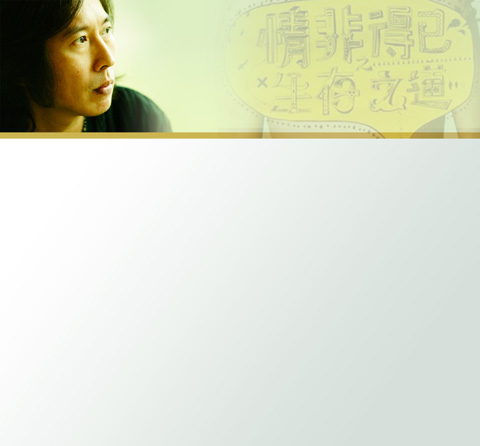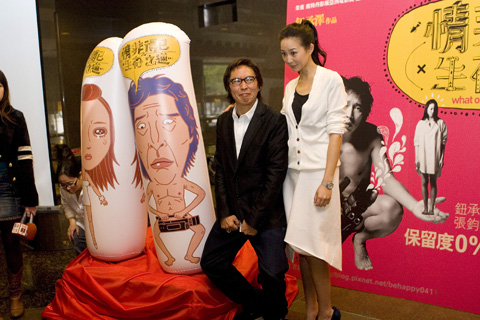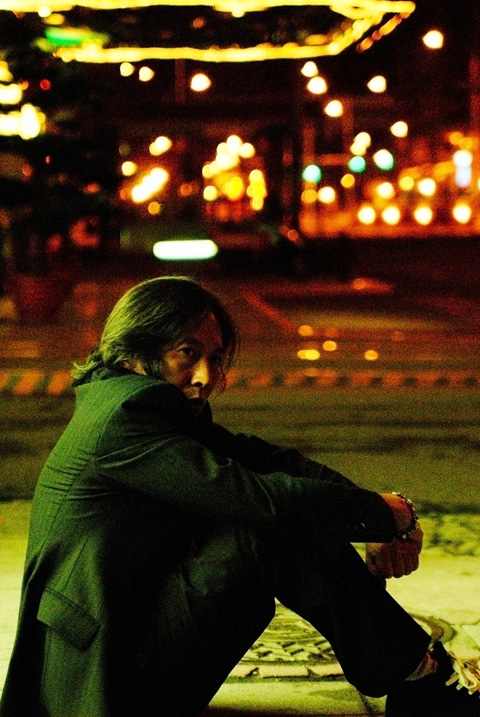Wearing jeans and a white T-shirt, Niu Chen-zer (鈕承澤) led me to the rooftop garden outside his study for our interview. His home, a modish two-floor apartment, is a tastefully designed retreat from Taipei’s bustling East District (東區), Funny and well-spoken, Niu talks with a sense of drama punctuated by contemplative pauses, expressive hand and facial gestures, and the occasional vulgarity.
Sometimes looking straight past me, as if he were delivering a monologue on stage, the 42-year-old actor and director declaimed at great length about his life, personal problems, and his new movie What on Earth Have I Done Wrong? (情非得已之生存之道). The film, produced and directed by Niu, is a semi-autobiographical tale starring the versatile director himself and is his first feature-length production after years of experience in acting and directing soap operas for television.
Taipei Times: The project (What on Earth Have I Done Wrong?) started out as a political satire in the form of a mockumentary. When and how did you decide to change it to a semi-autobiographical work?

PHOTO: COURTESY OF HONTO PRODUCTION
Niu Chen-zer: [Long pause] The film doesn’t come from here [points to his head], but from here [points to his heart]. It is not a meticulously calculated result, but a thing life pushed me to do. To put the whole story in a nutshell, my life crumbled when I approached 40. The woman I loved left me; I was lost, eaten away by distress and fear. Having spent half a year being with myself through counseling and meditation, I realized that we were way too used to pointing fingers at others, to playing the role of the victim to escape our responsibilities.
When negative situations and emotions such as frustration, anxiety and depression occur, I used to just run away — and there were many ways to get away: booze, drugs and sex. It was like a festering wound.
The setback two years ago forced me to face my problems. I had an epiphany, and with this epiphany, I realized I no longer wanted to make a mockumentary that pointed the finger at others, that thought it was so intelligent it could offer a collective out for everyone. I feel it is more meaningful to share how I feel and what I have been through with the audience. On a personal level, it is a film that thoroughly destroys Doze [Niu’s nickname] so that I can face the later half of my life with a clear conscience. On a broader scale, I hope the film can also help others to reveal their own truths.

PHOTO: COURTESY OF HONTO PRODUCTION
TT: In the beginning, did some people oppose the new direction?
NC: Yeah, because they didn’t know what I was up to. In fact, I didn’t know how to tell the story at first either. How could I turn my life experiences into a feature-length format and make it an interesting viewing experience rather than a pitiful self-indulgent work? It took me around six months to figure these things out.
TT: But you kept the documentary-like, oftentimes hand-held look.

PHOTO: COURTESY OF HONTO PRODUCTION
NC: I have an obsession with hand-held cinematography. With a limited budget, I wanted to make the film raw and direct. [He pauses.] It was an aesthetic choice made right from the start. I also wanted to create a restless feel and a sense of voyeurism, since part of the audience’s viewing pleasure comes from peeping at the life of this bastard called Niu Chen-zer.
TT: Was being a director a dream of yours?
NC: After starring in Growing Up (小畢的故事, 1983), I had this teenager’s dream of becoming a versatile filmmaker who could tell stories that Taiwanese cinema had not seen before. Was it because by being a director one could lord it over anyone on the set and fall in love with the leading lady? Or was it because being a director was a label that would set myself apart from other people? I don’t know. But because of the dream, I showed more interest in film production than other actors did. I would hang out with the lighting technicians during the shooting of one film and with producers during another.
(Niu began his acting career aged 9. Chen Kun-hou’s (陳坤厚) Growing Up made the child actor a pop icon and tagged him with a rebellious image. Hou Hsiao-hsien’s (侯孝賢) The Boys From Fengkuei (風櫃來的人, 1983) further established Niu’s status as one of the Taiwan New Wave’s principal stars.)
TT: Where did you receive your training in film production?
NC: I was an assistant director and producer for a couple of films by Chen Kuo-fu (陳國富) and I also worked with Wang Hsiao-ti (王小棣) for a while. But those experiences didn’t last. My life after Growing Up was quite empty and aimless. I wasn’t satisfied with my life and didn’t know what to do about it. I had no confidence and didn’t like myself. I had this title of “movie star” but only had NT$300 in my pocket. I had this cool car but only had money for two liters of gasoline. It was really twisted. Sometimes I would be like “Fuck, if I can’t make something out of life before I’m 30, I’ll join the mafia and become a big boss.”
(Niu candidly recounted his life story at length without pausing. He talked about how a conversation with close friend Li Li-chun (李立群) made him want to become a great actor when he was 28 years old. He talked about the process of transforming himself from a prima donna into an actor who cherished every chance to perform. When he decided he wanted to become a great actor, he also realized just how far away from achieving that goal he was. A few years went by, and an opportunity arose when Niu was invited to direct a television drama on China Television Co (中視) in 2000. It was well-received, as was another production in 2001. Niu said he went from thinking he might be able to become a director to thinking he could be a really good director. Taiwan’s pop idol opera (偶像劇) fever, the fad of soap operas starring pop idols, took off the same year, and the rest is history.)
TT: How is your relationship with Hou?
NC: Hou is the mentor who took me into the world of acting. He used to say to me when I was young: “Don’t act with your mouth. Act with your eyes.” I didn’t have a close relationship with my ailing father, and I think I projected some of that onto Hou as a father figure I respect and look up to.
Even now we see each other often, since we hang out at the same cafe. We talk about films and ideas. We are quite close [artistically], in fact, as we both place great emphasis on characters, on whether there is something real [emotionally] happening between them.
TT: But your and Hou’s films don’t come from the same cinematic family.
NC: [Niu uses a convoluted anecdote about a poem that may or may not have been written by Edgar Allen Poe to indicate he admires Hou’s films but wouldn’t make the same thing.] I don’t want to become him. It is exactly how I felt about Hou’s films when I was little. I was like “Yeah, you rock. If I won the lottery I would use the money to support you.” But honestly, I didn’t really understand most of his oeuvre. I have always been troubled by the question of why there are only two kinds of Taiwanese cinema: Hou on the one end and Chu Yen-ping (朱延平) [known for his slapstick blockbusters] on the other. There is nothing in-between.
TT: As a disciple of Taiwanese New Wave cinema who has become a director, what are your observations on recent developments in Taiwanese cinema.
NC: [Long pause.] Watching films by Hou, Edward Yang (楊德昌) and Tsai Ming-liang (蔡明亮) made me doubt myself. Am I too bala (芭樂) [the word bala means guava, but in this case has the connotation of “in poor taste” or “low-class”]? Are these the kind of films I should make to win awards? But now I can proudly say I am bala, bala with taste. Though nourished by the New Wave, I believe Taiwanese cinema should have different looks and styles.
I have doubts about filmmaking, too. It’s tough to make films without an industry, and you don’t know if the film can sell to make up for the cost. So you have these people wearing helmets and armor, dashing for their goals like there is no tomorrow. But they are not necessarily [at this point Niu narrates his internal thought process in which he searches for a polite way of phrasing his next statement] — mature. Yes, we are full of passion. Okay, we mortgage our houses and make films. We see glimmers in those works but they don’t have a good story to tell most of the time.
I really don’t want to abuse the slogan: support Taiwanese cinema. No one points a gun at your head and tells you to make films. How can I exploit the audience’s compassion and national pride and impose on them frustrating viewing experiences again and again?
In recent years, we have begun to see younger generations of filmmakers bring different perspectives and ways of thinking. But I often remind my young friends that, as filmmakers, we don’t have many opportunities amid this relatively barren environment. On a personal level, you only have one house to mortgage. In terms of the industry, the audience can’t endure repeated disappointments.
(With a polished cadence in his voice, no doubt the result of years of training as an actor, Niu’s answers come in eloquent torrents. But the seasoned thespian reveals a different side when, during our interview, he takes phone calls from loved ones, instantly switching into a boyish tone.)
TT: Any ideas for future projects?
NC: I want to make all kinds of films except for horror movies. One of the ideas is a gangster/action movie set in Mengjia (艋舺) [an area in Taipei] just before the lifting of martial law, [when the area] was saturated with color, the intensity of the surroundings, and the last moments of glory as the neighborhood began to fade into history. I want to reconstruct elements of the 1980s, the look, the clothes and the sound. I want to bring back bell-bottoms, compact disco and Air Supply.
To make an urban love comedy will be an extension of my own life story and my pop idol opera experience. I’m thinking of making a film starring, say Jay Chou (周杰倫) and Zhang Ziyi (章子怡), about a couple who are attracted to each other but don’t how whether they should have sex or not for 10 years.

May 11 to May 18 The original Taichung Railway Station was long thought to have been completely razed. Opening on May 15, 1905, the one-story wooden structure soon outgrew its purpose and was replaced in 1917 by a grandiose, Western-style station. During construction on the third-generation station in 2017, workers discovered the service pit for the original station’s locomotive depot. A year later, a small wooden building on site was determined by historians to be the first stationmaster’s office, built around 1908. With these findings, the Taichung Railway Station Cultural Park now boasts that it has

Wooden houses wedged between concrete, crumbling brick facades with roofs gaping to the sky, and tiled art deco buildings down narrow alleyways: Taichung Central District’s (中區) aging architecture reveals both the allure and reality of the old downtown. From Indigenous settlement to capital under Qing Dynasty rule through to Japanese colonization, Taichung’s Central District holds a long and layered history. The bygone beauty of its streets once earned it the nickname “Little Kyoto.” Since the late eighties, however, the shifting of economic and government centers westward signaled a gradual decline in the area’s evolving fortunes. With the regeneration of the once

The latest Formosa poll released at the end of last month shows confidence in President William Lai (賴清德) plunged 8.1 percent, while satisfaction with the Lai administration fared worse with a drop of 8.5 percent. Those lacking confidence in Lai jumped by 6 percent and dissatisfaction in his administration spiked up 6.7 percent. Confidence in Lai is still strong at 48.6 percent, compared to 43 percent lacking confidence — but this is his worst result overall since he took office. For the first time, dissatisfaction with his administration surpassed satisfaction, 47.3 to 47.1 percent. Though statistically a tie, for most

In February of this year the Taipei Times reported on the visit of Lienchiang County Commissioner Wang Chung-ming (王忠銘) of the Chinese Nationalist Party (KMT) and a delegation to a lantern festival in Fuzhou’s Mawei District in Fujian Province. “Today, Mawei and Matsu jointly marked the lantern festival,” Wang was quoted as saying, adding that both sides “being of one people,” is a cause for joy. Wang was passing around a common claim of officials of the People’s Republic of China (PRC) and the PRC’s allies and supporters in Taiwan — KMT and the Taiwan People’s Party — and elsewhere: Taiwan and